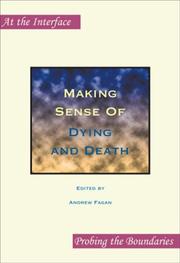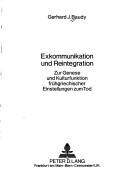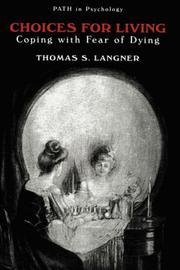| Listing 1 - 10 of 11 | << page >> |
Sort by
|
Book
ISBN: 9782718608501 2718608501 Year: 2011 Publisher: Paris Galilée
Abstract | Keywords | Export | Availability | Bookmark
 Loading...
Loading...Choose an application
- Reference Manager
- EndNote
- RefWorks (Direct export to RefWorks)
Dans «Le miracle secret», Borges imagine la mort étrange d’un écrivain praguois que la Gestapo arrête en mars 1939 et condamne, au seul prétexte qu’il est juif et qu’il a été dénoncé comme tel, à être passé par les armes. La nuit qui précède son exécution, il a rêvé que la voix même de Dieu lui accorde le temps nécessaire pour achever son travail. Le lendemain à l’aube, entre le moment où les soldats du peloton braquent leurs fusils sur lui et celui de la décharge mortelle, le temps de l’«univers physique» est comme suspendu : l’écrivain remanie et accomplit en secret son «oeuvre», à jamais pourtant inachevée. À la considérer sous l’angle de son ultime «récit» publié, L’Instant de ma mort, et d’un énigmatique fragment «autobiographique» antérieur, «(Une scène primitive ?)», on est peut-être en droit d’estimer que le conte de Borges emblématise assez bien l’oeuvre «désoeuvrée» de Blanchot, tout entière écrite ou réécrite, achevée inachevable, dans le temps incommensurable qui sépare le 20 juillet 1944, date à laquelle il faillit être fusillé par les nazis (ou telle journée de l’hiver 1914 ou 1915, qui fut celle d’une extase enfantine), et la mort désormais survenue le 20 février 2003 : le temps atemporel de l’agonie native et de la mort immémoriale, «impossible nécessaire», qui aura autorisé la dernière méditation de celui qui avait interrogé sans relâche la Littérature ou l’Écriture dans sa possibilité même. Ce livre tente de proposer une lecture de ces deux textes. Plus exactement, il les interroge pour mettre à l’épreuve ce qui, à travers la hantise du « mourir », s’est joué quant aux catégories majeures de la fiction et du mythe, du testimonial et du testamentaire, de l’aveu et du secret, de la non-présence à soi et du retrait, de l’autre (éthique) et de l’être-ensemble (politique), etc. Mais surtout quant à ce qu’il faut bien se résoudre à nommer l’écriture posthume de Blanchot.
Blanchot, Maurice --- Fear of death --- Criticism and interpretation --- Death, Fear of --- Thanatophobia --- Death --- Psychology, Pathological --- Psychological aspects --- Criticism and interpretation. --- モーリス・ブランショ --- Бланшо, Морис, --- Blansho, Moris, --- Blanshoy, Moris, --- Blanchot, Maurice - Criticism and interpretation
Book
ISBN: 9781472571625 1472571622 9781472571632 9781472571649 Year: 2016 Publisher: London Bloomsbury Academic
Abstract | Keywords | Export | Availability | Bookmark
 Loading...
Loading...Choose an application
- Reference Manager
- EndNote
- RefWorks (Direct export to RefWorks)
There are no atheists in foxholes; or so we hear. The thought that the fear of death motivates religious belief has been around since the earliest speculations about the origins of religion. There are hints of this idea in the ancient world, but the theory achieves prominence in the works of Enlightenment critics and Victorian theorists of religion, and has been further developed by contemporary cognitive scientists. Why do people believe in gods? Because they fear death. Yet despite the abiding appeal of this simple hypothesis, there has not been a systematic attempt to evaluate its central claims and the assumptions underlying them. Do human beings fear death? If so, who fears death more, religious or nonreligious people? Do reminders of our mortality really motivate religious belief? Do religious beliefs actually provide comfort against the inevitability of death? Jonathan Jong and Jamin Halberstadt begin to answer these questions, drawing on the extensive literature on the psychology of death anxiety and religious belief, from childhood to the point of death, as well as their own experimental research on conscious and unconscious fear and faith. In the course of their investigations, they consider the history of ideas about religion's origins, challenges of psychological measurement, and the very nature of emotion and belief.
Religion --- Fear of death --- Psychology, Religious --- Philosophy --- Fear of death. --- Psychology, Religious. --- Death, Fear of --- Thanatophobia --- Death --- Psychology, Pathological --- Psychology of religion --- Religions --- Religious psychology --- Psychology and religion --- Philosophy. --- Psychological aspects --- Psychology --- 159.92 --- Developmental psychology --- Religion - Philosophy

ISBN: 9042016418 9401201307 141756430X 9781417564309 Year: 2004 Publisher: Amsterdam Rodopi
Abstract | Keywords | Export | Availability | Bookmark
 Loading...
Loading...Choose an application
- Reference Manager
- EndNote
- RefWorks (Direct export to RefWorks)
This book aims to extend upon the growing body of literature concerned with dying and death. The book analyses various experiences and representations of dying and death from the perspective of academic disciplines as diverse as theology, philosophy, sociology, anthropology, and literature. The rationale for this is simple. As objects of study dying and death cannot be usefully reduced to a single academic perspective. One cannot hope to gain a deep and comprehensive understanding of dying and death by gazing at them through a single lens. Bringing various perspectives in a single volume aims to both accurately record those enduring properties of the phenomena, such as mourning and fear, whilst simultaneously analysing the diversity and heterogeneity of human beings' attempts to come to terms with this most forbidding of existential horizons.
Philosophical anthropology --- Attitude to Death. --- Death. --- Fear of death. --- Death, Fear of --- Thanatophobia --- Death --- Psychology, Pathological --- Dying --- End of life --- Life --- Terminal care --- Terminally ill --- Thanatology --- Psychological aspects --- Philosophy --- Reason. --- Mind --- Intellect --- Rationalism
Book
ISBN: 9782021079081 2021079082 Year: 2012 Volume: *31 Publisher: Paris : Seuil,
Abstract | Keywords | Export | Availability | Bookmark
 Loading...
Loading...Choose an application
- Reference Manager
- EndNote
- RefWorks (Direct export to RefWorks)
Philosophical anthropology --- Death --- Life --- Human beings --- Anthropologie philosophique --- Mort --- Vie --- Homme --- Fear of death --- Philosophical essay --- Death. --- Fear of death. --- Philosophical essay. --- Death, Fear of --- Thanatophobia --- Psychology, Pathological --- Dying --- End of life --- Terminal care --- Terminally ill --- Thanatology --- Psychological aspects --- Philosophy --- filmtheorie --- twintigste eeuw --- filosofie --- psychologie --- filmregisseurs --- Dardenne Luc --- 791.471 DARDENNE --- CPP --- La mort --- Absence --- La Peur --- Dieu

ISBN: 3820467823 Year: 1980 Volume: 18 Publisher: Frankfurt am Main : P.D. Lang,
Abstract | Keywords | Export | Availability | Bookmark
 Loading...
Loading...Choose an application
- Reference Manager
- EndNote
- RefWorks (Direct export to RefWorks)
Eschatology, Greco-Roman --- Eschatologie gréco-romaine --- Death --- -Death --- -Fear of death --- -Death, Fear of --- Thanatophobia --- Psychology, Pathological --- Dying --- End of life --- Life --- Terminal care --- Terminally ill --- Thanatology --- Social aspects --- -History --- Religious aspects --- History --- Psychological aspects --- Philosophy --- Fear of death --- History. --- -Social aspects --- Eschatologie gréco-romaine --- Death, Fear of --- Religious aspects&delete& --- Social aspects&delete&
Book
ISBN: 0470265086 9780470265086 Year: 1980 Publisher: New York (N.Y.): Gardner
Abstract | Keywords | Export | Availability | Bookmark
 Loading...
Loading...Choose an application
- Reference Manager
- EndNote
- RefWorks (Direct export to RefWorks)
Fear of death. --- Psychology, Pathological. --- #SBIB:316.356.2H4510 --- Gezin en gezondheid: algemeen --- Fear of death --- Psychology, Pathological --- Abnormal psychology --- Diseases, Mental --- Mental diseases --- Mental disorders --- Pathological psychology --- Psychology, Abnormal --- Psychopathology --- Death, Fear of --- Thanatophobia --- Neurology --- Brain --- Criminal psychology --- Mental health --- Psychiatry --- Psychoanalysis --- Death --- Diseases --- Psychological aspects
Book
ISBN: 1280805021 9786610805020 0387351450 Year: 2007 Publisher: New York, NY : Springer,
Abstract | Keywords | Export | Availability | Bookmark
 Loading...
Loading...Choose an application
- Reference Manager
- EndNote
- RefWorks (Direct export to RefWorks)
Never has our culture been more aware of personal and global health hazards, from both within and without. While most people may feel some anxiety in this regard, some have an unbearable sense of dread that prevents them from functioning. Chronic health anxiety—heightened fears of illness, disease, and death—is a central feature of hypochondriasis, of course, but can also present as depression, generalized anxiety disorder, OCD, and other diagnoses. Treating Health Anxiety offers the professional reader not only an understanding of this condition, but also an easily implemented cognitive behavioral program for reducing fear of illness, overcoming fear of death, and getting more enjoyment from life, including: -Step-by-step coverage of the assessment process and therapy sessions -Client worksheets and self-monitoring forms -Specific guidelines for treating health anxiety in children and the elderly -Strategies for handling impasses and setbacks -Up-to-date guide to pharmacotherapy for health anxiety As media attention to health issues increases, client fears of illness won’t go away any time soon. Treating Health Anxiety gives prescribing and non-prescribing clinicians (as well as the counselors and social workers who encounter the problem) the tools to reduce both the fears and the medical costs that so often accompany them.
Anxiety --- Fear of death. --- Treatment. --- Death, Fear of --- Thanatophobia --- Death --- Psychology, Pathological --- Psychological aspects --- Psychiatry. --- Psychology, clinical. --- Behavioral Therapy. --- Applied psychology. --- Clinical Psychology. --- Health Psychology. --- Psychotherapy and Counseling. --- Clinical psychology. --- Psychiatry --- Psychology, Applied --- Psychological tests --- Applied psychology --- Psychagogy --- Psychology, Practical --- Social psychotechnics --- Psychology --- Behavioral therapy --- Behavior modification --- Psychotherapy --- Medicine and psychology --- Mental health --- Behavioral therapy. --- Health psychology. --- Psychotherapy. --- Counseling. --- Counselling --- Helping behavior --- Clinical sociology --- Interviewing --- Personal coaching --- Social case work --- Therapy (Psychotherapy) --- Mental illness --- Mental health counseling --- Health psychology --- Health psychology, Clinical --- Psychology, Clinical health --- Psychology, Health --- Salutogenesis --- Clinical psychology --- Treatment
Book
ISBN: 3319590057 3319590049 Year: 2017 Publisher: New York, NY : Springer Berlin Heidelberg,
Abstract | Keywords | Export | Availability | Bookmark
 Loading...
Loading...Choose an application
- Reference Manager
- EndNote
- RefWorks (Direct export to RefWorks)
This book argues persuasively and passionately that patient care is best when the patient’s healing journey is as good as it can possibly be. That means the patient as a Whole Person – the self in all its physiological, emotional, social and even spiritual dimensions – should receive truly comprehensive patient-centered care. In Whole Person Care: Transforming Healthcare, the author, an expert in whole person care theory and practice, outlines the background of whole person care, explains and illustrates the key ideas, puts the growing movement of whole person care in the context of other recent developments in healthcare, and explores the implications of whole person care for individual practitioners, healthcare teams, and the organization of healthcare at the institutional and systems level. In addition, the author provides a compelling, coherent narrative, rich with clinical examples and vignettes, that clarifies for physicians, medical students and healthcare administrators the meaning of whole person care and its implications for the future of medical practice. An invaluable resource for all clinicians and personnel concerned with managing patients with acute and chronic illness, Whole Person Care: Transforming Healthcare is a major addition to the literature and a must-read for health practitioners and health administrators at every level.
Holistic medicine. --- Alternative medicine. --- Integrated delivery of health care. --- Medicine, Popular. --- Fear of death. --- Medicine. --- Anesthesiology. --- General practice (Medicine). --- Internal medicine. --- Pain medicine. --- Primary care (Medicine). --- Medicine & Public Health. --- Primary Care Medicine. --- General Practice / Family Medicine. --- Internal Medicine. --- Pain Medicine. --- Death, Fear of --- Thanatophobia --- Death --- Psychology, Pathological --- Medicine --- Delivery of health care, Integrated --- Integrated delivery of medical care --- Integrated delivery systems (Medical care) --- Integrated health care systems --- Integrated service networks (Medical care) --- Medical care --- Complementary medicine --- Healing systems --- Systems, Healing --- Systems, Therapeutic --- Therapeutic systems --- Integrative medicine --- Holistic health --- Wholistic medicine --- Alternative medicine --- Holism --- Functional medicine --- Health --- Mind and body --- Psychological aspects

ISBN: 0306466074 9786610208241 1280208244 030647462X Year: 2002 Publisher: New York : Kluwer Academic/Plenum Publishers,
Abstract | Keywords | Export | Availability | Bookmark
 Loading...
Loading...Choose an application
- Reference Manager
- EndNote
- RefWorks (Direct export to RefWorks)
Although many books are written about bereavement, very few are written about the fear of one's own death and most of these focus chiefly on terminal illness. In contrast, this book looks at the ways in which the fear of death operates on a back burner throughout our lives and how it influences the choices we make and the paths that we follow in life. The author presents a `moral hierarchy' of behavior used in coping with the fear of death and dying.
Conduct of life. --- Fear of death. --- Adaptation, Psychological --- Medicine. --- Psychiatry. --- Psychopharmacology. --- Clinical psychology. --- Personality. --- Social psychology. --- Cognitive psychology. --- Medicine & Public Health. --- Clinical Psychology. --- Personality and Social Psychology. --- Cognitive Psychology. --- Psychology, clinical. --- Consciousness. --- Medicine and psychology --- Mental health --- Psychology, Pathological --- Psychology, Cognitive --- Cognitive science --- Psychology --- Mass psychology --- Psychology, Social --- Human ecology --- Social groups --- Sociology --- Personal identity --- Personality psychology --- Personality theory --- Personality traits --- Personology --- Traits, Personality --- Individuality --- Persons --- Self --- Temperament --- Psychiatry --- Psychology, Applied --- Psychological tests --- Behavioral pharmacology --- Drugs --- Chemotherapy --- Pharmacology --- Psychotropic drugs --- Psychotropic effects --- Death, Fear of --- Thanatophobia --- Death --- Ethics, Practical --- Morals --- Personal conduct --- Ethics --- Philosophical counseling --- Psychological aspects
Book
ISBN: 1349953563 1349953555 Year: 2018 Publisher: New York : Palgrave Macmillan US : Imprint: Palgrave Macmillan,
Abstract | Keywords | Export | Availability | Bookmark
 Loading...
Loading...Choose an application
- Reference Manager
- EndNote
- RefWorks (Direct export to RefWorks)
This book examines how modern medicine’s mechanistic conception of the body has become a defense mechanism to cope with death anxiety. Robbins draws from research on the phenomenology of the body, the history of cadaver dissection, and empirical research in terror management theory to highlight how medical culture operates as an agent which promotes anesthetic consciousness as a habit of perception. In short, modern medicine’s comportment toward the cadaver promotes the suppression of the memory of the person who donated their body. This suppression of the memorial body comes at the price of concealing the lived, experiential body of patients in medical practice. Robbins argues that this style of coping has influenced Western culture and has helped to foster maladaptive patterns of perception associated with experiential avoidance, diminished empathy, death denial, and the dysregulation of emotion. .
Anesthetics --- Fear of death. --- Physiological effect. --- Psychological aspects. --- Psychology. --- Social medicine. --- Emotions. --- Critical psychology. --- Critical Psychology. --- Emotion. --- History of Psychology. --- Medical Sociology. --- Anaesthetics --- Anesthetic agents --- Central nervous system depressants --- Anesthesia --- Death, Fear of --- Thanatophobia --- Death --- Psychology, Pathological --- Physiological effect --- Psychological aspects --- Psychology --- History. --- Psychology, Critical --- Communism and psychology --- Feelings --- Human emotions --- Passions --- Affect (Psychology) --- Affective neuroscience --- Apathy --- Pathognomy --- Medical care --- Medical sociology --- Medicine --- Medicine, Social --- Public health --- Public welfare --- Sociology --- Medical ethics --- Medical sociologists --- Social aspects --- Behavioral sciences --- Mental philosophy --- Mind --- Science, Mental --- Human biology --- Philosophy --- Soul --- Mental health
| Listing 1 - 10 of 11 | << page >> |
Sort by
|

 Search
Search Feedback
Feedback About UniCat
About UniCat  Help
Help News
News